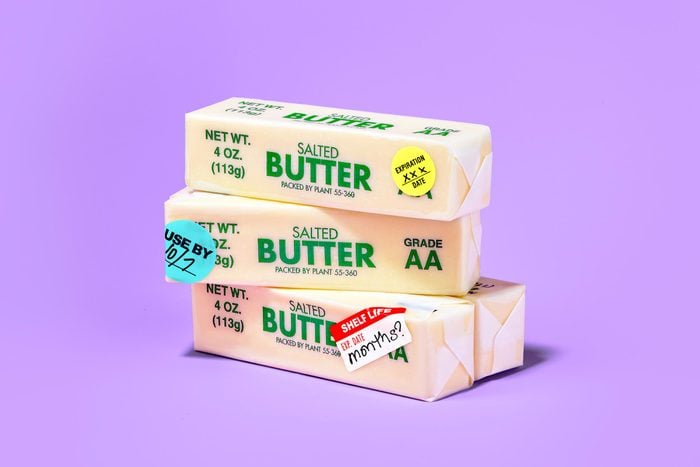Here’s How Fast Butter Expires—and How to Know Your Butter Is Bad
Updated: Nov. 04, 2022

Does butter expire? It certainly does, but how you store it has a lot to do with its shelf life.
There are some foods that never expire, and others that have sell-by dates far in the future. Dairy products like milk generally aren’t among them, but butter seems to be a different story. After all, you can store it on the counter, in the refrigerator or in the freezer, so you might be wondering, Does butter expire at all?
You might also be wondering about margarine, but we’ll get to that and other food facts later. When it comes to butter, the answer about its expiration date largely depends on how and where you store it. Here’s what you need to know.
Does butter expire?
Butter does, indeed, expire. Even if kept in the refrigerator, it eventually will go bad, which is why a good jumping-off point is checking the expiration date on the box or wrapper. Butter should keep—at the very least—until that date. If it’s well wrapped and stored in either the refrigerator or freezer, it could last anywhere from a month to a year.
But the more butter (and really, most foods) is exposed to elements like heat, light and oxygen, the more the fat inside breaks down, which is what makes it go bad. Colder temperatures, like in a fridge or freezer, help delay that.
“While all fats have a fairly long shelf life, butter has a lot of milk solids that make it go rancid, or spoil, faster,” explains Matt Regusci, a food safety expert with ASI Food. “If you process the milk fats out and create ghee (a type of clarified butter), the product will last much longer.”
That being said, even refrigerated butter will turn rancid at some point. While you have a little wiggle room with butter, you should never eat these foods past their expiration dates.
How long does it take for butter to expire?
The answer to this question really depends on how butter is stored. Remember, exposure to the elements exacerbates the expiration process, so it’s safe to say that butter that’s refrigerated or kept in the freezer will likely last longer than butter kept out on the counter. Still, all three methods are totally acceptable ways to store butter.
As a general rule, butter that’s tightly wrapped and refrigerated should last anywhere from one to three months, while butter that’s stored in the freezer can last up to a year. Storing your butter on the counter is just one trick to soften butter, but this storage spot has some drawbacks. According to the USDA’s Food Safety and Inspection Service, “butter and margarine are safe at room temperature. However, if butter is left out at room temperature for several days, the flavor can turn rancid, so it’s best to leave out whatever you can use within a day or two.”
If you’re wondering why butter can last so many months while refrigerated, it has to do with the amount of salt in it. That’s also why salted butter will likely last longer than unsalted butter. After all, salt is a preservative known to extend the shelf life of all kinds of foods, as well as stave off microbial growth like mold and bacteria. Now you might also be wondering if salt expires, and we have the answer to that too.
How do you know if your butter has gone bad?
Now that you know the answer to the question, Does butter expire? is yes, you need to learn how to tell if your butter has expired. Luckily, it’s pretty simple. You should be able to smell a sour scent, notice some obvious discoloration or even see mold. The presence of any of these is a clear indication that your butter has, in fact, gone bad.
Reader’s Digest reached out to Venae Watts, a butter maker at Minerva Dairy, for more insight. “Butter is one of the easiest products to tell when it goes bad. There is a two-way test: look and taste,” Watts explains. “Looking at the butter, do you see any spots that look like mold or something that does not look like it belongs? After passing the look [test], try a little bit for the taste test. If it is bad, you will know.”
As mentioned above, it’s always helpful to look at butter’s expiration date. This will give you a good place to start, even though it’s not something that’s set in stone. In fact, there are several different kinds of dates used on food packaging: “best if used by,” “best before,” “use by” and “sell by.” Each of these dates indicates quality, not expiration. Actually, a sell-by date isn’t even for you, the consumer; instead, it’s to signify to retailers when to take something off the shelves and replace it with something fresher. Use-by dates are a recommendation from the manufacturer, indicating the final date the food should be used.
Wondering if water can go bad? Learn more about your bottled water expiration date.
Is it OK to use expired butter?
Unless you can see any visible signs of expiration or notice a sour, unpleasant smell, it’s generally safe to use expired butter. “Except for use-by dates, product dates don’t always refer to home storage and use after purchase. Use-by dates usually refer to best quality and are not safety dates,” according to the USDA. “But even if the date expires during home storage, a product should be safe, wholesome and of good quality—if handled properly and kept at 40 degrees or below.”
Watts also adds: “You can absolutely eat butter past the sell-by or expiration dates. Just be smart and do the two-step test. The butter that passes is perfect to enjoy.”
How long is butter good for after the expiration date?
Again, this depends on how it’s been stored. Refrigerated butter should last up to a month past the printed date if it’s unopened. If the butter has been opened, it can last up to two weeks past that printed date. If you’re storing the butter longer term, unopened butter stored in the freezer can last anywhere from nine months to a year past the date.
Still, when it’s time to use the stored butter, be sure to check it out for noticeable signs of expiration. Even if it’s well within the allotted time frame, you definitely don’t want to eat any butter with mold on it!
How should you store butter?
The three main ways to store butter are in the refrigerator, in the freezer and on the counter. For long-term storage with the longest shelf life, consider storing it in the freezer. If you plan to use your butter within a few days, you can leave it on the counter. For butter that lasts one to three months, store it in the refrigerator.
While the storage methods are the same for salted and unsalted butter, keep in mind that unsalted butter will go bad faster. “Butter is best on the counter for performance and complexity of taste,” Watts says, “[but] unsalted butter does have a shorter shelf life than salted, by about 30 days shorter.”
So, if you prefer to store your butter on the counter, it may be wise to consider salted, pasteurized butter and to leave out only as much as you will go through in one to two days. It’s also worth noting that butter that’s left out might pick up the odors and tastes of what goes on around it—especially if left uncovered. To prevent this, store butter on the counter in a butter crock, a special dish with an airtight seal that keeps out potential contaminants.
Next, find out how long cooked meat lasts in the fridge and if flour ever goes bad.
Sources:
- Matt Regusci, a food safety expert with ASI Food
- USDA: “Is butter safe at room temperature?”
- Institute of Medicine (US) Committee: “Strategies to Reduce Sodium Intake in the United States”
- Venae Watts, a butter maker at Minerva Dairy
- USDA: “Food Product Dating”
- USDA: “Is food safe after the date expires?”



